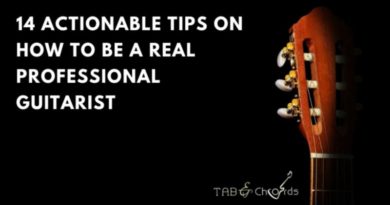6 Simple & Effective Guitar Practice Tips For the Beginners
Learning to play the guitar comes with some challenges. But you can make things much easier by taking some simple steps that will help you avoid common mistakes as you learn. Beginner guitarists tend to give up too quickly before they have really even begun.
It is vital to consider your mindset and approach to learning the guitar – do you find yourself getting frustrated easily? Maybe you need to adjust small things to improve your form while playing, such as how to properly hold a guitar pick or master rhythm and your strum pattern.
The following tips will help you get the most out of learning the guitar. And, it will apply whether you are learning the acoustic or electric guitar and whatever type of music you want to play – jazz, rock, classical, heavy metal, alternative, and more.
Exercise Patience
Everyone hopes that they can learn something quickly, and this goes for the guitar as well. The problem with this is that learning an instrument takes a lot of time, and you need to exercise patience. Time and practice are significant pieces to becoming great with the guitar.
The more you attempt to rush the process of learning the guitar, the more you increase the chance of picking up bad habits that won’t help you improve. You have to be ready to commit long-term and understand that it will take time. Your ability will improve little by little, but after a few months of consistent practice, you will be able to see a noticeable improvement.
Practicing consistently doesn’t require multiple hours or even an entire hour per day. Instead, dedicate a short block of time, maybe 15 to 30 minutes each day. You can even break up the thirty minutes and give yourself short breaks to concentrate fully during each short practice session. You will be surprised to see yourself progress rather quickly.
Practice Scales First
You might want to jump right into strumming full chords, but it would be most helpful if you start with mastering scales. This is because when you play scales, you only have to think about using one finger at a time. Sometimes, when you have to play a full chord, it can feel challenging and frustrating to try and think about multiple finger placements.
When you do chords later, your brain will have nailed down placement for your fingers from doing the scales. As a result, you will have a much easier time getting the chords down more quickly from working on scales prior.
Learn the Fundamentals
While some of the greatest guitar players out there are self-taught, there are still many benefits to learning proper technique and fundamentals of the guitar. Working with an experienced guitar instructor and teacher can help you master good guitar habits and gain valuable feedback to execute your playing well.
If you want to learn and ensure you don’t develop bad habits, you should work with an instructor and take guitar lessons. Building proper technique and your fine motor skills will go a long way to helping you understand and be able to pick up music to play.
You may want to save money and teach yourself by watching online tutorials, you may be able to learn effectively. However, you should ensure that you learn to focus on understanding the proper technique and fundamentals for the guitar before trying to jump into tackling the entire song. You should feel comfortable moving between chords, picking, plucking, etc.
Don’t Compare Yourself to Others
You may listen to some good guitarists and think, “I’m not that good.” Do not let yourself become frustrated during your journey because you compare your progress to others. Instead, you should only worry about your own progress and work little by little.
For example, it would be helpful to make some recordings of yourself when you are first starting with playing. Then, after a few consistent months of practice, record yourself playing again. When you listen to them side by side, you should be able to see significant changes and track that you have progressed, maybe even more than you anticipated.
Practice Your Struggles
Many times people tend to avoid things that they cannot do easily. However, the problem with this tactic is that you can never get better if you don’t tackle what is challenging for you head-on.
When you are practicing, note or write down what parts of the songs or what fingering or strumming is proving difficult for you. These are the areas that you need to work hardest with and practice more often to improve upon your skills. Breaking down songs into pieces can also help you learn and play better since you’re not feeling too overwhelmed with understanding it all at once.
Save the easy things for outside of your regular practice times. Then, you can impress others at get-togethers and parties with the guitar-playing aspects that are easier for you to play.
Don’t Give Up
Perseverance is key to improving and becoming a great guitarist. It might be easy to become frustrated and feel like you’re not good enough so that you quit.
However, every guitar player out there, even the greatest, hits walls from time to time. When you know that, it might help you to get through the challenging times that you are bound to face.
Take breaks frequently to relax, play something more manageable when you become too frustrated, or let your own creative juices flow and play something on your own. Then, when you have given it some time and feel ready to tackle the challenging parts, you can give it another try. Don’t allow the frustration to keep you from building upon your progress.
It may take you finding your own sound before you feel that you are getting somewhere in your learning journey. Experiment with different guitars; maybe an electric guitar isn’t suiting your feeling, and you want to work with acoustic, or vice versa. Try to find something that you like or play songs you want to play so that you can keep at it!
Support Us.


